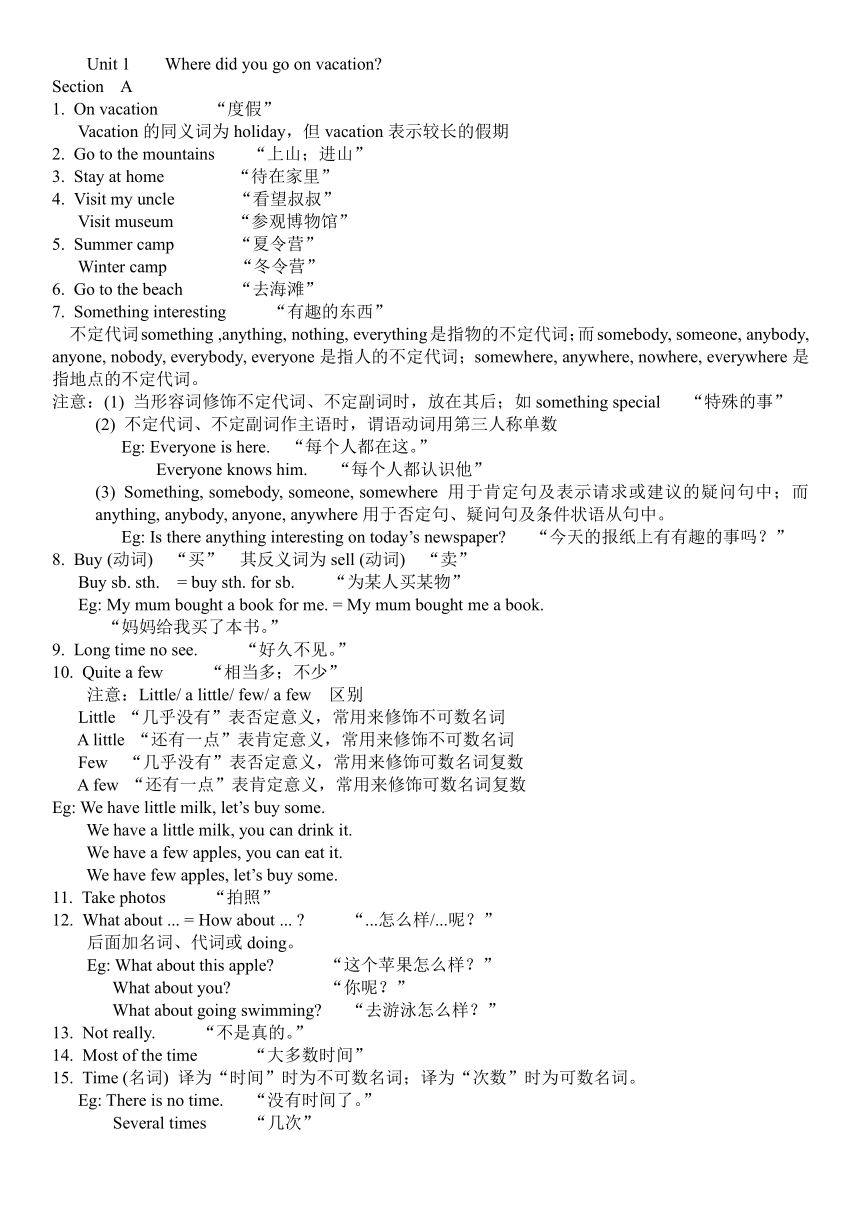
Unit 1 Where did you go on vacation Section A On vacation “度假” Vacation的同义词为holiday,但vacation表示较长的假期 Go to the mountains “上山;进山” Stay at home “待在家里” Visit my uncle “看望叔叔” Visit museum “参观博物馆” Summer camp “夏令营” Winter camp “冬令营” Go to the beach “去海滩” Something interesting “有趣的东西” 不定代词something ,anything, nothing, everything是指物的不定代词;而somebody, someone, anybody, anyone, nobody, everybody, everyone是指人的不定代词;somewhere, anywhere, nowhere, everywhere是指地点的不定代词。 注意:(1) 当形容词修饰不定代词、不定副词时,放在其后;如something special “特殊的事” 不定代词、不定副词作主语时,谓语动词用第三人称单数 Eg: Everyone is here. “每个人都在这。” Everyone knows him. “每个人都认识他” Something, somebody, someone, somewhere 用于肯定句及表示请求或建议的疑问句中;而anything, anybody, anyone, anywhere用于否定句、疑问句及条件状语从句中。 Eg: Is there anything interesting on today’s newspaper “今天的报纸上有有趣的事吗?” Buy (动词) “买” 其反义词为sell (动词) “卖” Buy sb. sth. = buy sth. for sb. “为某人买某物” Eg: My mum bought a book for me. = My mum bought me a book. “妈妈给我买了本书。” Long time no see. “好久不见。” Quite a few “相当多;不少” 注意:Little/ a little/ few/ a few 区别 Little “几乎没有”表否定意义,常用来修饰不可数名词 A little “还有一点”表肯定意义,常用来修饰不可数名词 Few “几乎没有”表否定意义,常用来修饰可数名词复数 A few “还有一点”表肯定意义,常用来修饰可数名词复数 Eg: We have little milk, let’s buy some. We have a little milk, you can drink it. We have a few apples, you can eat it. We have few apples, let’s buy some. Take photos “拍照” What about ... = How about ... “...怎么样/...呢?” 后面加名词、代词或doing。 Eg: What about this apple “这个苹果怎么样?” What about you “你呢?” What about going swimming “去游泳怎么样?” Not really. “不是真的。” Most of the time “大多数时间” Time (名词) 译为“时间”时为不可数名词;译为“次数”时为可数名词。 Eg: There is no time. “没有时间了。” Several times “几次” Grammar 一般过去时的特殊疑问句式 句型结构为:特殊疑问词 + was/were/did + 主语 + 动词原形 + 其它 Eg: Where were you born “你出生在哪里?” Who did you go with “你和谁去?” 知识点 No one “没有人” No one和none的区别: none即可指人又可指物;而no one只能指人 None作主语时,谓语动词用单复数均可;no one作主语时,谓语动词只能用单数 None常用简略答语,可以与of连用;no one只能单独使用,后面不可跟of Eg: -- How many people are there -- None. “--那有多少人? -- 没有人。” None of us want to see the movie. “我们没有一个人看过这部电影。” There was no one else here. “这里没有一个人。” Have a good time “玩得高兴” Taste really good “尝起来真好” Taste (名词) “味道 爱好” Eg: I don’t like the taste of olives. “我不喜欢橄榄的味道。” (动词) “品尝;体验” Eg: I want to taste this dish. “我想要尝一下这个菜。” (系动词) “尝起来” 后面加形容词 Eg: The soup tastes good. “这个汤尝起来很好。” My first time “我的第一次” Seem ... ...
~~ 您好,已阅读到文档的结尾了 ~~